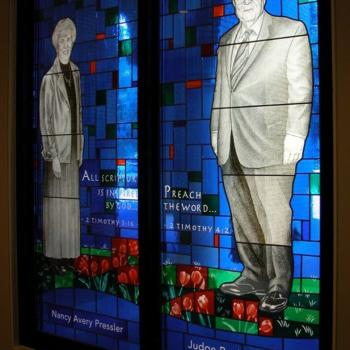It’s Pentecost, which makes it an ideal day to discuss yesterday’s joyous referendum in the Republic of Ireland, in which an overwhelming majority flooded the polls to enshrine the right to marriage equality for same-sex couples.
Pentecost is sort of like the Christian church’s birthday. It’s the day when we remember what the New Testament tells us — that the church is a new community that’s so mind-bogglingly inclusive that it makes everyone think we’re raving drunk. Ireland, yesterday, was a little picture of Pentecost — people from all walks of life, and from the far-flung diaspora, coming together in an intoxicating display of unity. (“We are not drunk, as you suppose,” the apostle Peter said to the people of Jerusalem, “for it is only 9 o’clock in the morning.” I’m not sure that argument works as well in Dublin.)

For Americans accustomed to the politicized culture-warrior bishops of the American Catholic church, it is startlingly to watch a pervasively Catholic country like Ireland mobilize in such a massive expression of support for the rights and dignity of LGBT people. After three decades of watching our nation’s Catholic bishops scrambling to enlist in the partisan culture-war of the white evangelical religious right, we’ve started to accept the American hierarchy’s claim that their church is, or must be, intrinsically right-wing and anti-gay. The news from Ireland is a reminder that this claim has never been true. The right-wing American hierarchy is a culture-war vanguard without an army.
“Irish Catholicism supports same-sex marriage,” Mark Silk writes in a smart column after the Irish vote. But he also notes that American Catholicism supports civil rights and human dignity for LGBT people too: “It’s no accident that Catholics in the U.S. — white, Hispanic, and otherwise — support same-sex marriage at the same rate as the Irish voted.”
The “Catholic position” on marriage equality turns out to be a lot like the “Catholic position” on contraception. There’s the official line promoted as dogma by the clergy, and then there’s the actual belief and practice of the overwhelming majority of the laity. And it’s not just that the laity disagree with the hierarchy, but that they find the hierarchy’s official stance to be immoral — sinful, harmful, and wicked.
Silk also argues that the Catholic bishops in Ireland tend to be more “linked to the populace” than their counterparts here in the U.S., and thus weren’t interested in becoming soldiers “in a culture war that divided their country.”
American culture-warriors will likely shrug that off, thinking, “Yeah, that’s why they lost.” But it’s still surprising, and refreshing, to look at what some of the Irish bishops were saying before their country’s vote and to see how different it is from the sort of thing we hear in the U.S. from our spiritual-leaders-turned-culture-war-snipers.
“I would hate for people to vote no for bad reasons, for sort of bigoted reasons, for nasty reasons, for bullying reasons,” Donal McKeown, the bishop of Derry, said before the referendum. McKeown voted no himself, and he wanted others to vote no as well, but not “for bad reasons.”
A culture-warrior could never say that. For a culture-warrior, a vote for your side is simply a vote for your side — no matter what the motive. If the bigots and nasty bullies can help your side win, then you need their votes. You need to make sure they stay fired up and turn out. Maybe you even need to fuel their bigotry and bullying a bit. Heck, if bullies and bigots turn out to be a reliable, vital swing vote for your side — the right side, the good side, God’s side — then maybe it’s even right and good and godly to increase the size of that voting bloc, making whatever appeals or dog-whistle statements are needed to nurture whatever motives (good, bad, bigoted, bullying) will ensure the proper desired outcome in this cultural battle.
To a culture-warrior, McKeown doesn’t sound like a pastor or a bishop, he just sounds like a loser. And that’s why he lost. If you want to win, you can’t refuse the help of any co-belligerents — no matter how bigoted or resentful or deluded. You have to marshal all of those allies and to generate more of them, if need be. And then, after victory is assured, you can stand triumphant on the scorched landscape that used to be the common good.
Every culture-warrior knows that the common good is like Bến Tre. Sometimes you have to destroy the culture in order to win it.
















